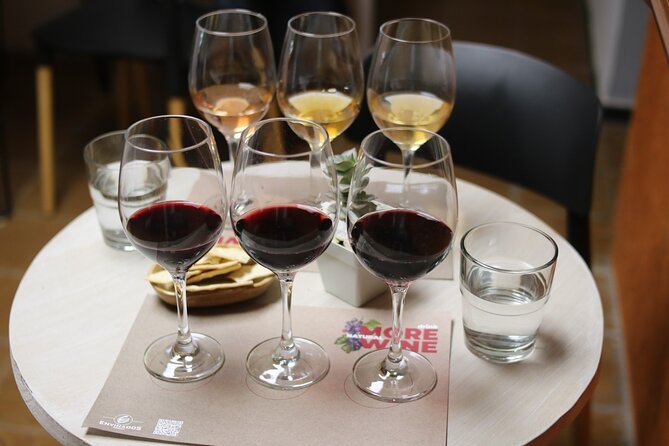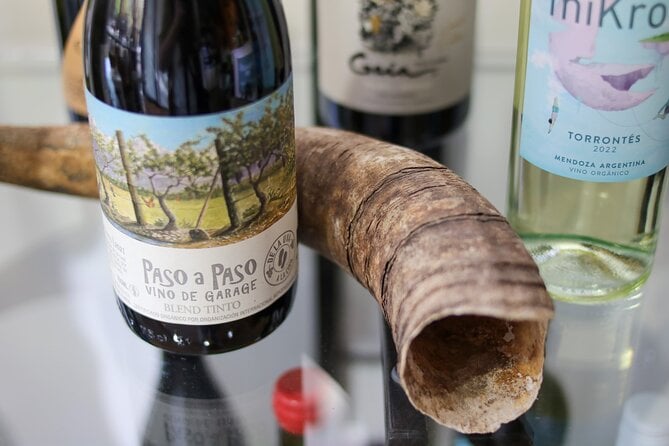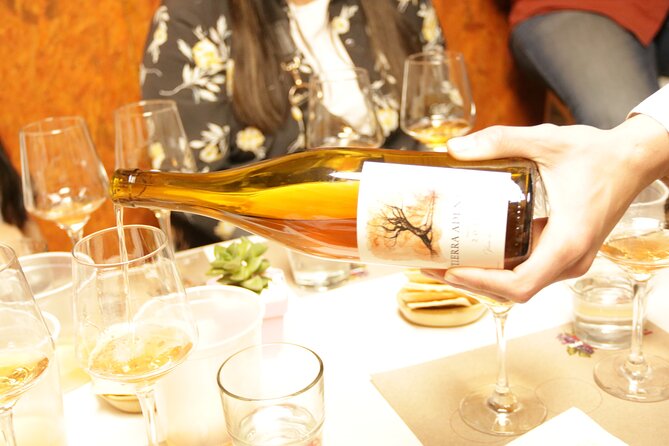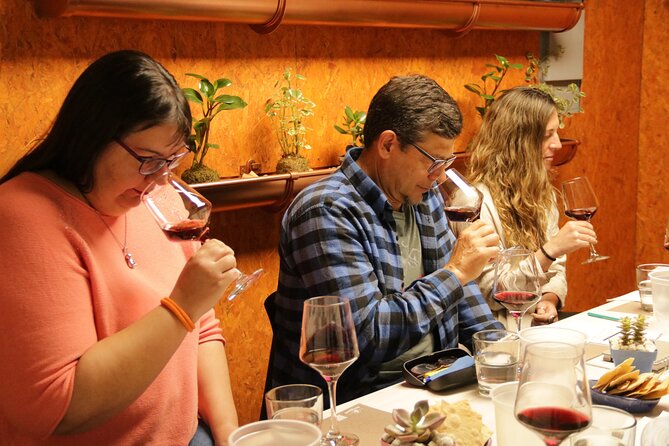Exploring the world of organic, biodynamic, and natural wines offers a unique opportunity to uncover the nuances of sustainable viticulture. This immersive tasting class delves into the distinct flavor profiles and production methods of these eco-friendly wines, inviting participants to embark on a journey of discovery. From the vibrant Malbecs of Mendoza to the complex biodynamic reds, attendees will gain a deeper appreciation for the intricate balance between the vine, the soil, and the winemaker’s craft. As the tasting progresses, the class explores the benefits of these alternative winemaking practices and how they contribute to a more harmonious relationship between the land and the bottle.
Key Points

- Comprehensive overview of organic, biodynamic, and natural wine styles, including their unique flavor profiles and winemaking practices.
- Guided vineyard tour and insights into the sustainable production methods used by the winery.
- Comparative tasting session to explore the differences between the various wine types and their food pairing suggestions.
- Emphasis on the environmental and quality benefits of eco-friendly winemaking approaches.
- Accommodations for participants with dietary restrictions, ensuring an inclusive and enjoyable experience.
What Are Organic, Biodynamic, and Natural Wines?
Organic, biodynamic, and natural wines refer to specific wine production methods that prioritize sustainability and minimal intervention.
Organic wines are made from grapes grown without synthetic pesticides, fertilizers, or additives.
Biodynamic wines go a step further, using holistic, earth-friendly farming practices.
Natural wines minimize intervention in the winemaking process, often avoiding filtration, fining, and the addition of sulfites.
These approaches aim to preserve the authentic flavors and characteristics of the grapes.
Compared to conventionally produced wines, organic, biodynamic, and natural wines often have a more distinct, terroir-driven profile that reflects the local ecosystem and winemaker’s techniques.
Ready to swirl and sip more? More wine adventures we love in Mendoza
Benefits of Organic and Biodynamic Winemaking

The benefits of organic and biodynamic winemaking extend beyond the environmental impact.
These sustainable practices also improve the quality of the wine itself. Organically grown grapes are free from synthetic pesticides and fertilizers, resulting in more vibrant, complex flavors.
Biodynamic farming goes a step further, treating the vineyard as a self-sustaining ecosystem. This holistic approach enhances the wine’s terroir, or unique expression of the local environment.
On top of that, organic and biodynamic wines often have lower alcohol content, making them more refreshing and balanced.
With growing consumer demand for eco-friendly and healthier products, these winemaking methods provide a competitive edge in the market.
Tasting Notes and Flavor Profiles

This tasting class offers participants the opportunity to explore a diverse array of organic, biodynamic, and natural wines from the renowned Mendoza region of Argentina.
The expert host guides guests through the tasting, providing detailed insights into the unique flavor profiles of each wine.
Attendees will learn to discern the subtle nuances that distinguish these artisanal wines, from the bright, fruit-forward notes of a Malbec to the earthy, mineral-driven characteristics of a Cabernet Sauvignon.
Through this immersive experience, participants develop a deeper appreciation for the art of winemaking and the diverse terroir of Mendoza, leaving with a newfound knowledge of these sustainable and eco-friendly wine styles.
Vineyard Tour and Winemaking Process
Along With tasting the diverse wines, participants in this class also have the opportunity to go on a guided tour of the local vineyards.
During the tour, they’ll learn about the region’s unique terroir and the sustainable farming practices used by the winemakers. Visitors can observe the grapevines, learn about the different grape varietals, and gain insights into the winemaking process.
From harvesting the grapes to fermentation and aging, the tour provides a comprehensive understanding of how these exceptional wines are produced.
Comparison of Organic, Biodynamic, and Natural Wines
Organic, biodynamic, and natural wines represent distinct approaches to viticulture and winemaking, each with its own unique characteristics and benefits. Organic wines are produced using sustainable farming methods and without the use of synthetic chemicals, while biodynamic wines follow a holistic, ecological approach to grape growing. Natural wines, on the other hand, are made with minimal intervention, often with native yeasts and little to no added sulfites.
| Characteristic | Organic | Biodynamic | Natural |
|---|---|---|---|
| Farming | Sustainable, chemical-free | Holistic, ecological | Minimal intervention |
| Winemaking | Limited additives | Spontaneous fermentation | Native yeasts, low/no sulfites |
| Flavors | Bright, fruit-forward | Complex, terroir-driven | Unique, sometimes unpredictable |
These distinct wine styles offer wine enthusiasts a range of sensory experiences and environmental benefits to explore.
Taste buds happy? More delicious discoveries we love in Mendoza
Food Pairing Suggestions

The diverse flavors and characteristics of organic, biodynamic, and natural wines pair exceptionally well with a wide range of cuisine.
The subtle minerality and crisp acidity of a natural white wine complement seafood dishes, while the robust tannins and bold fruit notes of a biodynamic red wine pair beautifully with grilled meats.
Organic rosés offer a refreshing complement to salads and vegetable-based meals.
Participants in the wine tasting class learn how to identify the most complementary food pairings, enhancing the overall enjoyment of these unique and flavorful wines.
With guidance from the knowledgeable host, guests discover the art of pairing organic, biodynamic, and natural wines with their favorite foods.
Sustainable Practices in Winemaking
Oftentimes, organic and biodynamic wineries employ sustainable practices throughout their vineyards and winemaking processes. This includes minimizing the use of synthetic fertilizers and pesticides, implementing water conservation techniques, and relying on renewable energy sources.
Many also utilize natural composting methods to enrich the soil. Winemakers may even decide to bottle their wines without using any sulfites, a common preservative.
These eco-friendly approaches not only benefit the environment but also contribute to the distinct flavors and aromas found in organic, biodynamic, and natural wines.
During the tasting class, you will learn about the specific sustainable practices employed at the featured wineries.
Frequently Asked Questions
As participants learn about the sustainable practices employed by the featured wineries during the tasting class, they may have additional questions.
Is the tasting class suitable for those with dietary restrictions? Can infants and children attend? What if I need to cancel my reservation? The tour organizers are happy to address any concerns.
The class is open to all over the age of 18 and accommodates vegetarian, vegan, and gluten-free diets with prior notice.
While infants can attend, the experience isn’t recommended for pregnant women.
Cancellations made within 24 hours are subject to a fee, but the tour can be rescheduled for flexibility.
Frequently Asked Questions
Is Transportation to the Meeting Point Included?
The information provided does not indicate that transportation to the meeting point is included. The activity begins and ends at the Envinados Mendoza Wine Bar, so participants are responsible for their own transportation to the meeting location.
Can I Request a Vegetarian or Gluten-Free Snack Option?
The experience doesn’t explicitly mention vegetarian or gluten-free snack options, but travelers can likely request these upon booking or by contacting the host. The provider aims to accommodate dietary preferences when possible.
What Is the Dress Code for the Tasting Class?
The class has a casual, relaxed dress code. Participants can wear comfortable clothing, as they’ll be seated for the tasting session. No formal attire is required, but guests should avoid wearing extremely casual or revealing outfits.
Can I Purchase Wines at the End of the Experience?
After the wine tasting class, guests can purchase the wines they’ve sampled. The activity takes place at a local wine bar, so participants can easily purchase bottles to take home and enjoy further.
Is Photography Allowed During the Tasting and Tour?
According to the details provided, photography is allowed during the wine tasting and tour experience. The experience description does not mention any restrictions on taking photos throughout the activity.
Recap
Exploring organic, biodynamic, and natural wines offers a unique opportunity to discover exceptional flavors while supporting sustainable winemaking practices. Through guided tastings and expert insights, participants can deepen their appreciation for these eco-friendly styles and their positive impact on the environment. This immersive experience celebrates both the quality of the wines and the commitment to responsible viticulture.
More Wine Tours in Mendoza
- Savoring Luján De Cuyo: a Culinary and Wine Exploration
- Ultimate Maipú Adventure: Winery Tour & Gourmet Lunch
- Domaine Bousquet Winery Tour With Horseback Riding and Lunch
- Horseback Riding, Barbecue and Wines in Tupungato, Uco Valley
- Full Day Private Uco Valley Wine Tour From Mendoza
- Winemaker for a Day. Learn How to Make Your Own Wine
More Food & Drink Experiences in Mendoza
- Argentina Tasting Experience: 34 Local Delights to Savor
- Uco Valley Winery Tour. Tasting + Premium Wine as a Gift
- Bike & Wine Tasting With Regional Food in Zuccardi Winery (From Mendoza)
- Tasting in Two Wineries + Full Lunch. Transfer Included
- Deluxe Mendoza Half-Day Wine Tasting Tour
- Bike & Wine Tasting With Regional Food in Zuccardi Winery (From Mendoza)
More Tour Reviews in Mendoza
Not for you? Here's more things to do in Mendoza we have recnetly reviewed
- 5 Best 3 Day Tours In Mendoza
- 8 Best BBQ Experiences In Mendoza
- 7 Best Dining Experiences In Mendoza
- 20 Best Full-Day Tours In Mendoza
- 3 Best 2 Day Tours In Mendoza
- 4 Best Food Tours In Mendoza
- 7 Best Massage And Relaxation Services In Mendoza
- 7 Best Dinner Tours In Mendoza
- 25 Best Lunch Experiences In Mendoza
- Mendoza: Uspallata, Aconcagua, and Puente Del Inca Day Trip
- Half Day Canopy in Potrerillos
- Full Day Trekking to Vallecitos, From Mendoza
